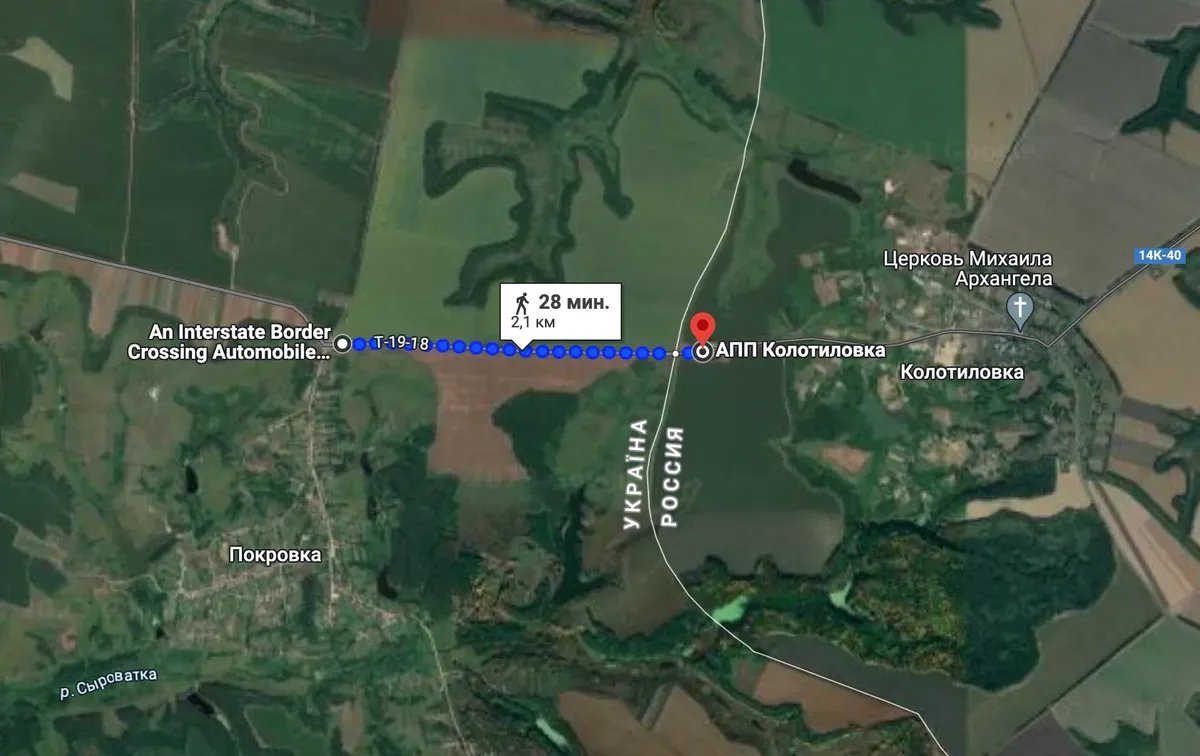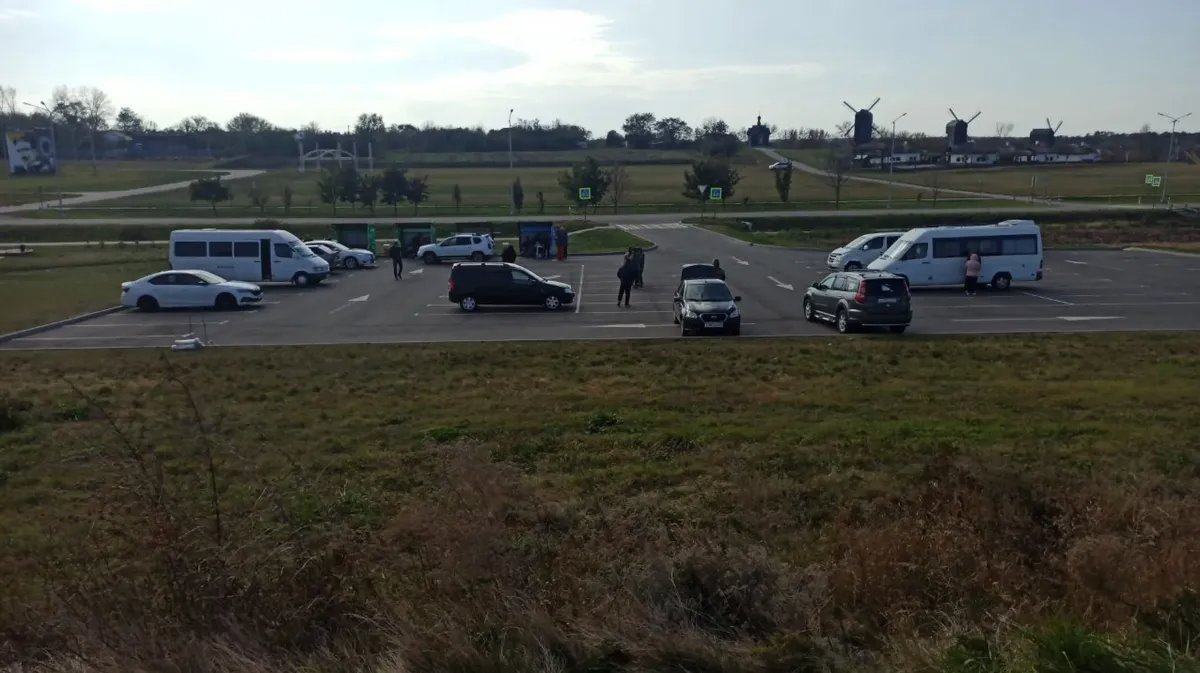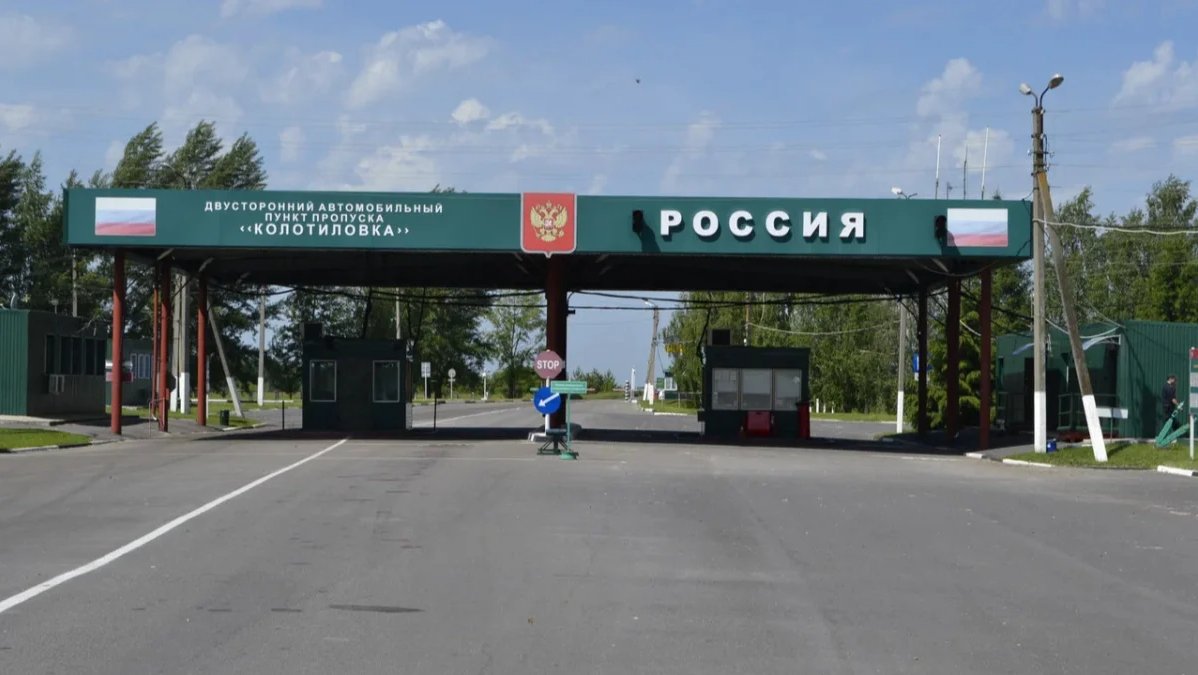The sole functioning border crossing from Russia into Ukraine at Kolotilovka is a one-way humanitarian corridor that allows Ukrainians to travel home as long as they’re prepared to wait for days on end. Often closed due to shelling, the checkpoint has recently seen a huge backlog of people develop, supplemented by both volunteers and grifters.
A 2-kilometre gravel road separates the Ukrainian checkpoint at Pokrovka in the Sumy region from the Russian checkpoint at Kolotilovka in the Belgorod region. The only way across is on foot, which takes 40 minutes even without luggage, but can take well over an hour for those carrying lots of their belongings or helping others across. “You can’t expect anyone to help,” one person who recently made the crossing said, adding “on this road it’s everyone for themselves”.

The road between the checkpoints. Photo: Google Maps
Out in the cold
The checkpoint at Kolotilovka has been busy ever since the start of the war as it is the last-remaining direct crossing between Russia and Ukraine. According to the BBC, it is mostly people from the occupied Donetsk, Luhansk, Kherson and Zaporizhzhia regions who use it to return home. It is also the closest option and relatively cheap for those coming from Russia.
The checkpoint has been forced to close for several days at a time due to shelling, and on multiple other occasions to allow for prisoner exchanges as well as for the return of the bodies of dead soldiers. As winter sets in, working hours are set to be curtailed further.
For that reason, a long queue formed near Kolotilovka in early October. In the summer, about 170 people could cross the border each day, but according to the BBC, only 70–80 Ukrainians made it through on 3 October. With temperatures barely rising above zero, those left in the queue quickly needed to find places to stay. The local hostel soon filled up. Some spent the night on buses while others slept on the road.
“On Wednesday morning, we saw an elderly woman on a bench, her clothes partially covered in frost. Meanwhile, the queue was growing. There were 50 people on Wednesday morning, but by Friday that had grown to 250,” two local volunteers told the BBC.
A Telegram thread discussing the situation at the border reveals that many hadn’t been able to cross the border on 4 October and had waited more than a day.
The checkpoint wasn’t open on the morning of 7 October and the queue continued to grow. Many people didn’t go to a hostel overnight as they were afraid of losing their place.
The temperature currently drops to zero at night here, and volunteers have been working hard to prevent people from freezing.
“People waiting to cross the border need shelter, hot food and drinks and somewhere to sleep for a few hours at least,” says Nadin, a volunteer.
“People are scared to leave. They think ‘What if we make it through today by some miracle?’ So they stand there and freeze. It’s good if you’ve used a courier. Then, at least, you can keep warm in your vehicle. One local woman in Kolotilovka rents out beds, but only has 10. There is a hostel in Krasnaya Yaruga with beds for 800 rubles (€8), but it is almost 20 kilometres from the border, and there is no easy way of getting there. Taxis would cost another 500 to 800 rubles,” local volunteer Maria tells the BBC.
But many people who waited at the border for several days did leave for Belgorod or other cities in the area and stayed in hostels or with volunteers.
“There were people everywhere. Some drove away from the checkpoint and slept in their cars. So how did things work after that? Anyone who stayed nearby in Kolotilovka or had contact with couriers would hear whether the queue was moving. When it did, they would return to the checkpoint, because you can’t stay outside in the cold for three days in October,” says Nadin.
She is now raising funds for a tent with basic furniture, a generator, fuel and a diesel heater. Volunteers are trying to provide hundreds of Ukrainians with food, hot drinks and thermal blankets.
Costs are increasing by the day. On 17 October, an elderly lady needed to cross the border. She weighed 38kg, couldn’t walk unaided or even sit due to a tumour, so volunteers sought funds for a stretcher and payment for couriers to take her across.
Money talks
Ukrainians who have crossed the border told the Belgorod Telegram channel Pepel that places in the queue were for sale.
Volunteers describe the process of paying to cross the border. By 9am, when the checkpoint opens, couriers on buses are in the queue. People put their names down with the duty officer who then calls them forward in batches of ten. The couriers tell the duty officer they have more passengers than they actually do and people can then pay for the remaining seats. It is one way for those crossing independently to speed up the process.
“There are currently four buses and four cars in Kolotilovka. The queue will take three to four hours. You can never tell how many people are on a bus. The courier quotes a number, but nobody checks, so you can pay to take one of the unclaimed seats,” wrote one person on the Kolotilovka-Pokrovka Telegram channel on 12 October.

A car park near Kolotilovka. Photo: social media
One woman said someone was offering to get people across the border for 3,000 rubles (€30). Those willing to pay went to a separate bus, where 28 other Ukrainians were already waiting.
These places were being sold on behalf of someone called Yelena Lyatanskaya, whose business cards were handed out to the Ukrainians by an unknown woman in a silver Renault Logan. Pepel writes that considering Lyatanskaya “works as an ordinary cashier, she was most likely just raising money for local officials. We don’t know whether border guards were part of this scheme.”
Irina crossed the border with her husband and three children two weeks ago. She told the BBC that a woman met her in the car park, put her on the list and told her she would have to wait three days. The duty officer suggested they could pay 3,000 rubles (€30) per person instead. At that point, Irina’s family got on the first bus in the queue and reached the border quickly.
“That woman had been sent by the local authorities. She started negotiating with the couriers herself,” Sergey, a volunteer, explains.
He says the authorities make money by artificially inflating the queue.
Appealing to the authorities
While volunteers are attempting to help people in the queue themselves, they are also attempting to get the authorities involved. Notably, they have appealed directly to the governor of the Belgorod region, Vyacheslav Gladkov, the Ministry of Emergency Situations and even Russia’s Federal Security Service (FSB).
“We ask you to organise heated tents with benches, thermostats, beds and thermal blankets in the checkpoint area urgently. We also ask you to distribute hot drinks and meals.”
Volunteers also demanded the FSB send additional border guards to the checkpoint to expedite the crossings.
The authorities have yet to respond. But after media reports on the selling of seats at the border crossing, the queue has significantly decreased.
“After all the fuss, people did finally get across, but the story doesn’t end there. Even if there is no queue, people are still waiting for three to six hours. These are unrealistic conditions for pensioners and children,” Nadin observed.
Делайте «Новую» вместе с нами!
В России введена военная цензура. Независимая журналистика под запретом. В этих условиях делать расследования из России и о России становится не просто сложнее, но и опаснее. Но мы продолжаем работу, потому что знаем, что наши читатели остаются свободными людьми. «Новая газета Европа» отчитывается только перед вами и зависит только от вас. Помогите нам оставаться антидотом от диктатуры — поддержите нас деньгами.
By clicking the Support button, you agree to the processing of your personal data.
To cancel a regular donation, please write to [email protected]

